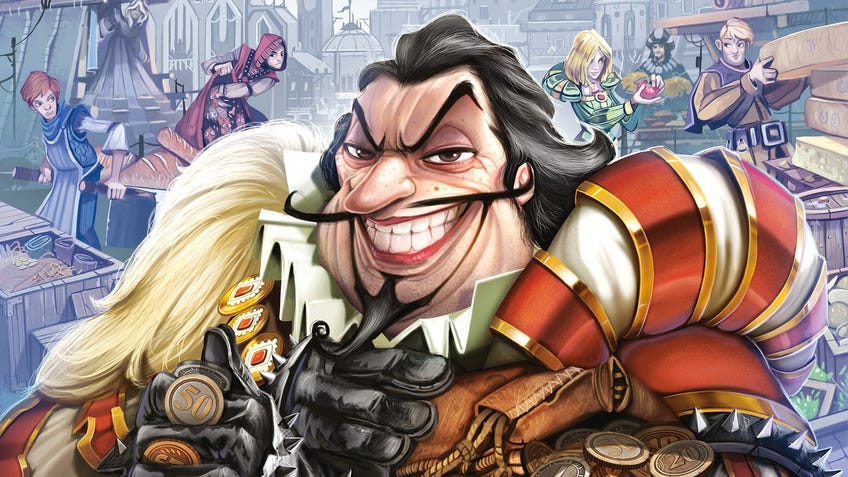What are you playing this weekend? Here’s what we’ve been playing!
Let us know what’s on your table lately!
Welcome back! I hope your week has been a good one, and the weekend’s looking even better.
If you’re new here, this is our new regular feature on Dicebreaker where we fill you in on the games we’ve been playing - especially those we might not have had the chance to talk about elsewhere on the website or YouTube channel.
It’s also a chance for you to tell us what you’ve been enjoying, because we love to hear from you and there are more games coming out every month than a handful of people can keep up with. Hidden gems, revisited classics, new discoveries, old favourites - we want to know about them all!
To kick things off, this week we’ve been exploring a Wild West filled with ghosts and ghoulies, a miniature MOBA battlefield, a Nottingham filled with smuggling merchants, and more.
Let us know in the comments what you’ve been playing recently!
What We’ve Been Playing - January 27th 2023
Deadlands: The Weird West
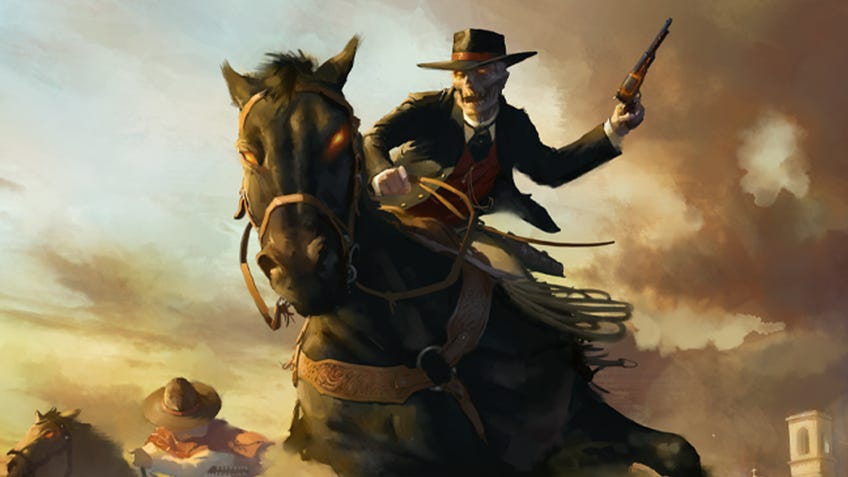
Before recently, I hadn’t returned to Deadlands since Johnny took us through a one-shot for the YouTube channel around the release of last edition The Weird West. But their masterful GMing and the irresistible made-for-me combination of dusty Wild West shootouts (it helps I have been replaying Red Dead Redemption 2 lately) and supernatural cosmic horror had always left me wanting to go back.
Luckily for me, my roleplaying group had just wrapped up a run of Monster of the Week and was looking for something new in terms of both game system and setting. After steering towards classic fantasy for a bit - with The One Ring and Old School Essentials in the running - we suddenly took a hard left turn and managed to agree that strapping on some spurs and shouting “yeehaw” across the kitchen table sounded like a good time.
And it is! Deadlands, for those unfamiliar, runs on top of the flexible Savage Worlds ruleset. It means that you have to juggle the original Savage Worlds book and the Deadlands tome, but the basics are straightforward enough to get to grips without much headache. Savage Worlds uses one of my favourite RPG mechanics: the type of die you roll changes based on your proficiency in a skill, advancing from a d4 all the way up to a d12. It’s a meaningful way to make your talents feel like they’re getting better with each point you invest, neatly shortcutting a bunch of convoluted modifiers along the way. (And giving you an excuse to actually use that whole set of fancy polyhedrons you bought.)
While neither Savage Worlds nor Deadlands are perfect - there are a few mechanical gripes, and some broader thematic and philosophical stances that raise an eyebrow - like all good RPGs, the rules and inspiring setting are a solid enough foundation to take in whatever direction you want.
In our case, our posse is a travelling circus troupe, staffed by - among others - a harrowed gunslinger who can’t win a duel to save his (un)life (that’s me), a virtuous pastor and a wandering mother accompanied by a mule claimed to have mathematical powers. Swinging from duels - which make inventive use of a deck of playing cards - to digging into Deadlands’ more mysterious and magical underbelly is a joy session after session, helped by our wonderful GM’s ability to roll with some of the goofier directions we take along the way. Truly, you’ve never roleplayed until you’ve attempted to unionise a river full of magical talking drowned corpses.
Matt
Sheriff of Nottingham: Second Edition
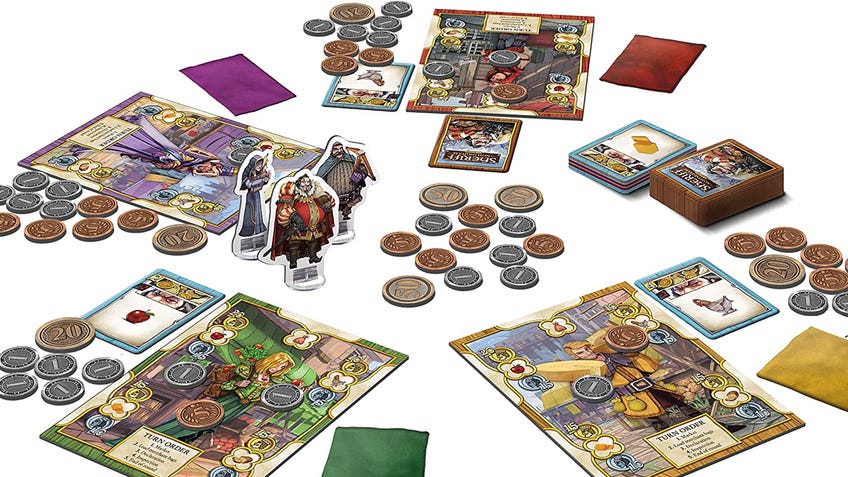
It’s certainly nice to go back to a board game you’ve haven’t played in a while to discover it still holds up. Sheriff of Nottingham has received a revamp in recent years with its second edition, with the title now being published by CMON instead of Arcane Wonders. Though there was a minor hullabaloo around the change in art style - I personally prefer the new cartoony aesthetic over the original - this version of the board game offers some nice little additions, such as a mode that supports up to six players and some extra rules to spice things up.
Sheriff of Nottingham is an interesting hybrid of social deduction and resource management, with players taking the role of merchant and sheriff intermittently. As merchants, players are attempting to earn as much profit as possible by getting various products into the market. Standing in their way is the Sheriff, a member of local law enforcement who doesn’t take kindly to anyone attempting to smuggle in undeclared goods.
Every round sees one player taking the role of the sheriff, whilst all other players must decide what they want to bring into the market from their hand of cards. Players put their chosen goods into these lovely little felt bags that had unfortunately been roughed up in the copy we were playing with - shout-out to Dice Board Game Lounge in Portsmouth. The players then declare how many of which produce they’re bringing to the market that round. Players can choose to either tell the full truth or a half-truth, disclosing everything in their bag or just some of the items.
Should the sheriff check a bag that contains something the player did not disclose, they have to pay a penalty to the sheriff. Inspection of a truthful player will result in the sheriff having to pay them for the inconvenience. This aspect of the game is easily the best part and led to several excellent instances of roleplay in our playthrough. Some players will ruthlessly check every bag, whilst others will interrogate first or even accept bribes.
The interplay between merchants and the sheriff feels like social deduction-lite, as players are free to decide to not smuggle if they don’t want to lie. Furthermore, as I found out in our game, success isn’t necessarily dependent on smuggling: as the winner managed to grab a win by snagging bonuses on collecting the most produce of certain types.
Meehan
Undaunted: Stalingrad
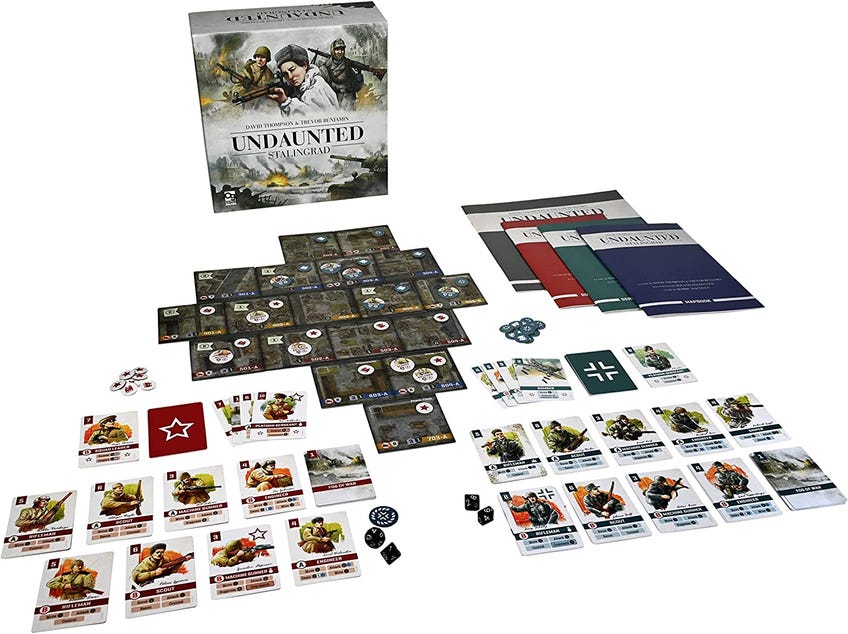
Wheels and I sat down to crack out Undaunted: Stalingrad over lunch this week. This is the legacy version of Undaunted taking place during World War 2 where you play as Russia and Germany through a series of battles to see who progresses best in the war. During the game anything you do in a session is carried over. Buildings can be blown up, changing the map for the rest of play, or - as me and Wheels found out - soldier casualties can turn into deaths. My scout didn’t survive and, rather than replacing him with another trained fighter, I had to recruit from my general population, bringing in someone less specialised and weaker all round. This means you feel the effects of each battle the more you play, making you worried about someone else getting hurt. Especially as there are narrative books to read through that set up characters in the platoon, their relationships and thoughts. I have Otto and Max, two competitive but caring friends that I am now terrified of losing for fear of how the other one will cope. Yes, they are merely cards, but I still care!
Undaunted revolves around building up those cards into the best deck for each battle. You start with a standard squad and can bring in more fighters as you go, manipulating your hand to have more riflemen or gunners depending on the fight. All this makes it feel like a miniatures game turned into a board game. A character sheet is replaced with your deck, and miniatures are now counters, but that feeling of skirmish warfare stays. Careful movement and strategic thinking are a must. I can definitely see Wheels and I playing over lunch again and taking our battle to the bitter end.
Maddie
Guards of Atlantis 2
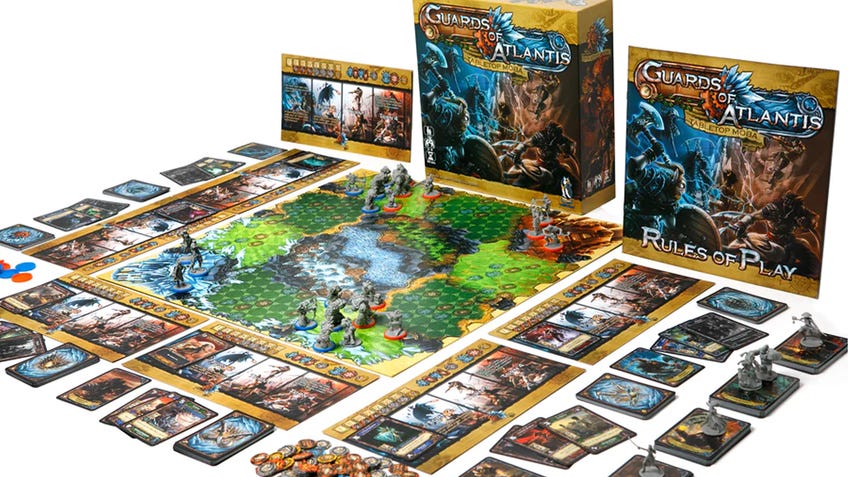
I wasn’t sure how to react when a friend asked me to join him and a couple others to play a “MOBA-style board game” called Guards of Atlantis 2. This interesting beast is a complete reimagining of its predecessor, crowdfunded last year by studio Wolff Designa, that purports to be “zero luck” and a fair interpretation of competitive video games such as Dota 2, League of Legends and Smite. I’ve long since grown out of my love affair with laning, last-hitting creeps and team fights outside Baron Nashor’s pit, but the concept of translating the high-energy genre to a medium known for thoughtful decision-making intrigued me.
Reader, I’m left feeling pretty darn ambivalent. Players choose heroes and split into teams of two or three for the four- and six-player modes, respectively, and plop their miniature outside their team’s base. Winning can be achieved by depleting the enemy’s respawn tokens - consumed after killing a player character - pushing the dynamic line of skirmishing minions into the enemy base or simply holding the lead after a certain number of turns.
Probably the best part of Guards of Atlantis 2’s design is the card action economy. Rounds are composed of four turns, and each player has a hand of five cards at their disposal. Everyone chooses a card in secret, reveals them simultaneously and then plays out the effects in descending order of initiative values listed at the top. Defending attacks requires you to discard cards, and a concerted effort can exhaust someone’s hand with alarming speed. But those same cards might be better spent clearing out NPC enemy troops and using the money gained to level-up.
As characters grow in strength, they unlock new cards that replace one of the five in their hand, essentially upgrading an existing ability. Each character boasts a signature attack and skill along with a basic attack, defend and utility card. For example, my cutpurse cat man excelled at slashing quickly and manoeuvring around the battlefield while stealing coins from other players, but his defences were pure dogwater. A single hit ran a high risk of sending me directly back to spawn, meaning I spent the majority of the first half carefully plotting how I skulked around the field and when was the perfect time to strike.
That delicious choice anxiety fell away as I levelled up, and by the end I was ignoring minions as everyone made a mad dash to blow up each other using their most powerful cards. There’s a tense push-and-pull when players use their skills to help push the minion wave forward that was completely spoiled in my session by dint of everyone’s power curve. We’ve decided to give it another go to rule-out learning fatigue or poor hero choices, but Guards of Atlantis 2 currently feels like an excellent idea that gets lost too deep in its own fantasy.
Chase
